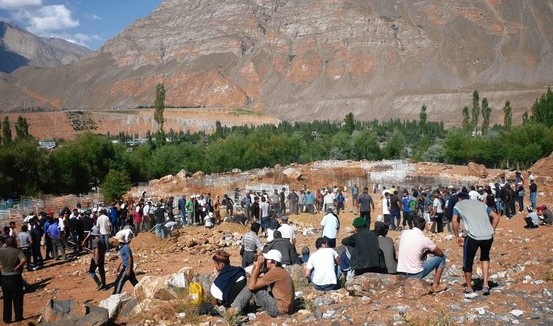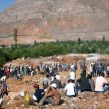
Following Armed Clashes, Peace Negotiations in Tajikistan’s GBAO Region Continue
Publication: Eurasia Daily Monitor Volume: 9 Issue: 146
By:

The fighting that began last week in the Autonomous Oblast of Gorno-Badakshan (GBAO) in Tajikistan (see EDM, July 27) has stopped, and it appears that a peace deal between the government and armed fighters has been reached. Amidst public outcry on July 25, the President of Tajikistan, Emomalii Rahmon, issued a three day cease fire in order to negotiate a peaceful deal with the armed fighters (Ozodi, July 30). Over the weekend, a 20-member commission headed by Qodir Qosim, the governor of GBAO, and consisting of influential local figures including representatives of the Agha Khan Foundation was dispatched to Khorog to mediate talks.
Local media reports suggest that the broad terms of the agreement are the disarmament and surrender of all fighters in exchange for amnesty. Imomnazar Imomnazarov, one of the leaders of the armed group, is quoted as saying that representatives of the government have promised amnesty to all participants in the recent violence in exchange for the capture of Tolib Ayombekov and two of his commanders, who are suspects in the killing of General Abdullo Nazarov (Ozodi, July 30; for background on Ayombekov see Militant Leadership Monitor, July 30). Currently, at least 100 firearms have been voluntarily turned over to government officials. According to another written statement, Tolib Ayombekov has expressed willingness to negotiate and cooperate in an investigation regarding the killing of General Abdullo Nazarov, but has stipulated that experts from the CSTO be included in the investigative body (BBC Tajiki, July 29).
For the moment it appears that the likelihood of a successful deal is high and in the interest of both sides. Surrounded and outgunned, Ayombekov and his fighters appear to be clamoring for a return to the pre-clash status quo. From the government’s perspective, a quick end to the conflict is advantageous because of fears that a protracted conflict could undermine the legitimacy of the regime. Furthermore, the government’s heavy-handed techniques, specifically its decision to deploy troops to Khorog and sever all forms of communications in GBAO have garnered much domestic and international criticism.
With a short-term peace nearly achieved, the government will now likely turn its attention to framing the narrative of events. Over the past week, the government has been engaged in a smear campaign against Tolib Ayombekov and members of his armed group, accusing them of illicit trafficking in heroin, humans, gemstones and tobacco (Khovar, July 30). While these allegations are most likely true, Ayombekov was a uniformed government official beholden (at least nominally) to the rule of law. The government’s attempt to discredit him risks further exposing its corruption and toleration of criminal syndicates in its midst. Likewise, the recent news of the killing of Sabzali Mamadrizoev, the head of GBAO’s branch of the Islamic Renaissance Party of Tajikistan (IRPT) (see below), has the potential to undermine the government’s claim that the military operation in Khorog was simply a matter of bringing the killers of General Nazarov to justice.
On July 23 in Khorog, two days after the murder of Nazarov in nearby Ishkashim district, Mamadrizoev gave a public speech critical of Tajikistan’s government (Ozodi, July 30). The speech, which was released on YouTube, addressed the issues of corruption and the lack of democratic rights in the country (https://kemyaesaadat.com/index.php?option=com_content&view=article&id=4233:1&catid=2:2008-12-09-19-14-56&Itemid=646). Muhiddin Kabiri, the head of the IRPT, confirmed Mamadrizoev’s death and noted in a press conference in Dushanbe on July 30 that Mamadrizoev’s July 23 speech was “within the legal framework and expressed the kind of logical criticisms that all legal political parties have raised” (Ozodi, July 30).
While his death has been confirmed by all parties, there are at least two competing versions explaining how it happened. Kabiri and other IRPT sources claim that he was detained on either July 23 or 24, taken to a military post known as “Qal’a,” insulted, beaten and then shot several times. His body was found two days later and buried (Ozodi, July 29; BBC Tajiki, July 30). On the contrary, government officials insist that Mamadrizoev was killed on July 24, in the course of a special operation, and that an AK-47 and two hand grenades were found next to his corpse (Tojnews, July 27).
Sabzali Mamadrizoev was elected to lead GBAO region’s branch of the IRPT in July of last year. Previously the post had been vacant for more than a year following the untimely death of former leader, Siroj Kalonov (Asia Plus, July 18, 2011). According to Zavqibek Rahmonov, the head of the IRPT’s branch in Vanj district, Kalonov fell suddenly ill after a local meeting and was taken to the hospital where he died a few days later. In July of 2011, at the meeting to appoint Mamadrizoev as Kalonov’s successor, members of the party complained of harassment by local security officials (Ozodi, July 17, 2011).
Prior to being elected local branch head of the GBAO IRPT in 2011, Mamadrizoev had expressed public support for two other notable protests in Khorog. In 2010, Khorog witnessed large (for Tajikistan) protests, sparked by the controversial court case of Kayon Rahimkhuddoev who was convicted of murder (Ozodi, June 16, 2011). Following the sentencing, several hundred people gathered to protest. Among them was a group of approximately 40 people who threw rocks at the court building, beat four of the court’s staff, and smashed several doors and windows (BBC Tajiki, June 15, 2011). While it is not known if Mamadrizoev took part in the protests (violent or otherwise), in an interview with Radio Ozodi, he publically condemned both the court ruling and the government’s response to the subsequent demonstrations. Likewise, in 2008, he took part in protests demanding the withdrawal of troops deployed to GBAO, tasked with detaining civil war era commanders (RFE/RL, June 18, 2008; see EDM, June 20, 2008). Strong armed techniques against opposition parties are nothing new in Tajikistan. However, given the public furor over its role in the recent events in GBAO, the government risks winning the battle in Khorog only to lose the long-term war of maintaining stability in the country.




